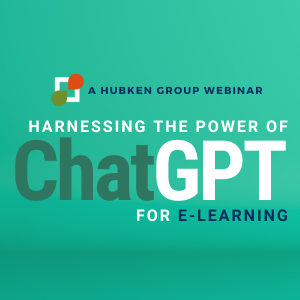The e-learning industry has drastically evolved over the years, led by new and exciting technological advancements. From the introduction of online video training sessions to detailed, personalised and bespoke training courses – the learning experience has transformed significantly compared with even a few years ago. With the development of artificial intelligence technology, we could see further revolutionising within the e-learning industry. In this blog we will explore the potential impact of ChatGPT and AI tools using the poll results from our ChatGPT focussed webinar, looking at how AI could contribute to the future of e-learning – keep reading to find out more.
How do AI tools for e-learning work?
AI tools such as ChatGPT learn from data and use algorithms to make predictions and decisions based on that data. Most AI tools have been designed to mirror human cognitive functions, such as problem-solving, and are programmed to produce content or answers that could have been produced by a human.
When it comes to using AI tools for e-learning, users can access the appropriate AI platforms or programmes to suit their e-learning needs and input data that will provoke the AI tool to create the desired response.
What did our webinar audience have to say about AI tools for e-learning?
During our hugely popular webinar, ‘Harnessing the power of ChatGPT for e-learning’, we asked our audience to answer several poll questions. The results provided a fascinating insight into how people are hoping to use AI tools and what their future role in e-learning might look like. Let’s explore some of them.
What is your primary motivation for using AI in e-learning?
38% - To automate content creation and assessment
33% - To improve learner engagement and motivation
14% - To personalise learning experiences for learners
Automating content creation and assessments
One of the most time-consuming aspects of delivering powerful e-learning programmes is creating engaging, informative and effective content for learners. This can be particularly difficult for organisations starting their L&D programmes from scratch; without existing content to fall back on or adapt, they may rely on third-party content creators to generate content. While this is suitable for bespoke e-learning courses with elements such as interactive content, it can be costly to use a third-party content creator to produce a full L&D resource library.
If an organisation has tasked L&D managers with creating content for e-learning courses, AI tools can save a great deal of time and effort. AI tools such as ChatGPT allow users to create content quickly and efficiently by automatically generating content when inputting topics, keywords, or key information. As a result, AI technology allows organisations to write content which can easily be uploaded onto an e-learning platform such as a learning management system (LMS).
It's worth noting, however, that content should always be fact-checked if it is being used for educational purposes. Matt Linaker, Partner Onboarding and Enablement Lead for Totara, pointed out in our webinar that it’s important to “never present information that you’ve taken from ChatGPT if you don’t understand it yourself”. Matt suggested consulting with a subject matter expert (SME) first and then using ChatGPT as an aid to help effectively word and produce content.
Assessments in the form of fun quizzes, formal exams or end-of-course refresher tests are an integral part of e-learning for many organisations. Whilst LMSs like Totara Learn offer the functionality to create assessments, producing the questions and answers can be time-consuming. AI Tools can be used to automatically create assessments by inputting readily available, existing data. AI technology allows users to choose a preferred type of assessment, such as a five-question multiple choice quiz – saving hours of manual admin.
Improving learner engagement and motivation
There are a number of ways to boost learner engagement and motivation; the majority of these initiatives involve designing and adapting content to create a richer, more diverse and interesting learning experience – which requires significant input. AI tools make it easier to produce engaging content, adapting the content to suit the needs and preferences of learners within an organisation.
An effective strategy in ensuring learners are engaged is to introduce micro-learning. This learning style consists of short bursts of content which typically take under 15 minutes to consume. Users of AI platforms can input large training documents and ask them to split content up into smaller, concise lessons that will ensure learners remain engaged.
Similarly, AI tools can take existing L&D content and ‘gamify’ it, adapting long-form written content and turning it into gamified lessons – boosting both engagement and motivation. AI-powered gamification will look to inject competitive elements with measurement units designed to recognise learners with high scores and motivate them via leader boards or badges. It’s worth noting, however, that although AI tools can create gamified lessons, an organisation will need to find a way to implement this via their e-learning platform, which may require plug-ins compatible with a powerful LMS such as Totara Learn.
How do you see AI impacting the future of e-learning?
58% - It will have a moderate impact on e-learning and will mainly assist in content creation and assessment
29% - It will revolutionise e-learning and lead to more personalised and effective learning experiences
13% - It will have a limited impact on e-learning and will mainly be used for basic tasks like automated grading and feedback
Personalised and effective learning experiences
Personalising the learning experience is a tried and tested technique used by many organisations. This method delivers better results, higher engagement levels, increased knowledge retention rates and much more.
Using AI technology, L&D managers can utilise natural language processing to determine the correct learning path for each individual learner. As Darren Bindert, Marketing Manager at Hubken, noted in our ChatGPT focussed webinar; “Some universities are already using AI tools to create personalised study plans for students that are based completely around their individual goals and learning styles rather than adapting a one size fits all or one size fits a smaller group”.

Users can input data which allows AI technology to understand a learner’s interests, preferences, learning style and required or desired skills. With this data AI tools can recommend a learning path for individual learners, ensuring they receive personalised and effective experiences. L&D admins can then use this data to set learners on the best learning path using their LMS or e-learning platform.
Automated grading and feedback
Most LMSs have an assessment functionality, with technology in place to automatically mark and grade assessments. However, these are mostly limited to assessments designed to simply assess a learner’s ability to recognise and recall information such as multiple-choice tests, short quizzes or matching the word to the definition. These assessment types have a definitive right or wrong answer which can be input into an LMS so that results can be automatically marked and graded. What current e-learning systems are incapable of is marking assessments which ask learners to demonstrate a deeper understanding of the material they are learning, such as a long-form essay-style assessment.
The future of AI for many educational organisations is AI-graded assessments, including long-form writing. AI tools can replicate the grading process used by humans and using this information automatically grade essays. As a result, teachers and educational professionals will be able to grade papers that have been uploaded onto the e-learning system in bulk – saving hours of marking time. However, it’s worth noting that these papers should also be manually reviewed to ensure the AI grading is accurate.
Want to find out more about the future of AI in e-learning?
Having explored just some of the ways that AI tools may impact the future of e-learning using the poll results from our webinar audience, perhaps you’d like to explore this topic further by hearing from our panel of experts. Sign up to receive the free full recording of our webinar: ‘Harnessing the power of ChatGPT for e-learning’. Click on the link below to find out more about what to expect from this hugely popular webinar!

Sign up to watch our ChatGPT focussed webinar
Follow the link below to sign up for the free recording of our webinar: 'Harnessing the power of ChatGPT for e-learning'.
%20(1).png?width=1080&height=520&name=A%20Hubken%20Group%20webinar%20(1820%20%C3%97%20520px)%20(1).png)
.png?width=1080&height=520&name=Blog%20CTAs%20(18).png)



